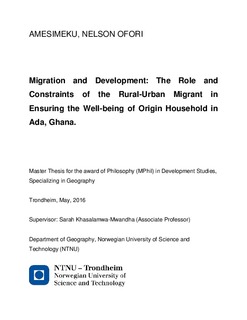| dc.description.abstract | Rural-urban migration is a regular phenomenon in developing countries and Ghana’s case is not too different from the other countries. This study explores how labor migrants from a poor rural setting in Ghana influence the well-being of their households of origin. The study area consisted of three (3) rural agricultural Dangme - Speaking communities (Kajanya, Toje, and Afiadenyigba) located in Ada East District of Ghana. Employing a combination of labor migration theories, this study presents the specific factors that influence the decision to migrate, the roles labor migrants play in the households of origin, the challenges they face as well as how labor-migrant households differ from non-labor-migrant households. The outcomes of the study reveal a combination of individual level, household level, and community level factors to have accounted for the decision of labor migrants to migrate. High income risks of poor households caused by perceived changing conditions of farming such as low rainfall and declining prices, which pose threats to profit, food security, and consumption coupled with the unavailability of jobs in the communities were among the factors causing migration. In this study, the major role labor migrants have played in the households of origin was remittance transfers determined by the interplay of obligation, migrant constraints, and household expection. Remittances provided an immediate addition to household incomes yet the effectiveness of these roles were limited by high cost of living and high bills. Due to the nature of the bills which are non-negotiable, labor migrants have to prioritize them as they directly affect their businesses and sustenance.
Overall, labor-migrant and non-labor-migrant households have differed in the sense that they have more income sources which have improved consumptions, health and education of household members than the non-labor-migrant households. The study suggests that in order that poor households do not become dependents on remittances, it will be of great importance if other strategies be formulated by the government to improve the household economy. | nb_NO |
